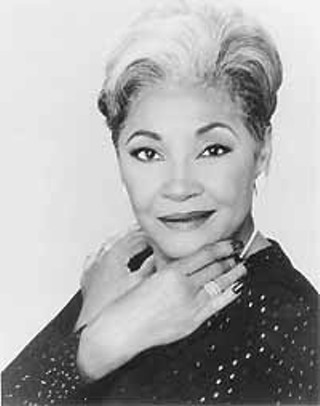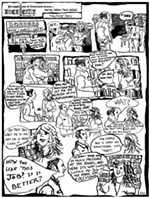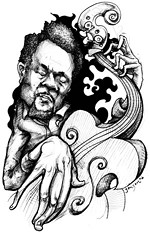Lush Life
Miss Nancy Wilson
By Harvey Pekar, Fri., June 2, 2000

Miss Nancy Wilson would rather call herself a "song stylist" instead of limiting herself to just jazz; certainly that explains her cross-genre appeal to pop and R&B fans. Neither does she alter her style to suit any particular group of fans. Instead, she's a world-class interpreter of everything from blues and gospel to Broadway showtunes, at home whether backed by a string-laden orchestra or austere jazz trio. Wilson, who has now cut more than 70 albums, came to New York in 1959 from Columbus, Ohio, and was on the way up within a year. She's been nominated for five Grammys, winning in 1964, and received an Emmy for the 1967-68 television program The Nancy Wilson Show. She's had hit albums and hit singles, acted in film and television, and received a host of awards for her charitable and humanitarian work. She seems to have done it all.
"I'm not seeking anything," she's says with an air of satisfaction.
Wilson's family moved to Columbus from tiny Chillicothe, Ohio, shortly after Nancy was born there in 1937. Her father encouraged her love of music from an early age, playing jazz and R&B records for his young daughter. At age 15, she entered a voice contest with other high school kids and so impressed the judges that she won her own television show, Skyline Melodies. She also worked in local and area clubs with Raleigh Randolph's 18-piece Sultans of Swing and Rusty Bryant's Carolyn Club Band. Bryant, who later did some straight jazz albums for Prestige, was a nationally prominent R&B artist during the 1950s who had a big hit with "Back Street."
"He walked the bar," Wilson recalls of those rough-and-tumble juke-joint days when chaperones were a must for teenage performers. "My dad was with me or my brother."
Wilson credits Dinah Washington and Sarah Vaughan as early inspirations, but says she owes more to the male R&B artists favored by her father such as Bull Moose Jackson, Louis Jordan, and especially Jimmy Scott.
"Jimmy sustained notes, Dinah clipped them," she explains. "Today and 25 years ago, I sounded more like Jimmy than any other singer."
Wilson attended Columbus' Central State University for a while, but with seven years of professional singing already under her belt, she decided to move to New York, where she already had at least one powerful friend and would soon make others. Alto sax great Cannonball Adderley, who had performed with Wilson in Columbus, became an ally. She secured the services of John Levy, among the shrewdest and best-connected of New York managers. Capitol Records -- which she chose for its strong track record with vocalists Frank Sinatra, Peggy Lee, and Nat King Cole -- signed her off a tape she sent in, and she began recording shortly after her move.
"It was a singer's label," she says. "They did things properly. You did an album in three nights."
While praising the expertise of Capitol's arrangers and conductors, Wilson also says they didn't pressure her on matters like song selection: "They let me be myself." She also developed a very close relationship with Capitol producer Dave Cavanaugh, behind the boards for some of her most impressive albums.
Moving to New York can be a difficult, even traumatic, experience for jazz singers and instrumentalists. It's the musical capital of the world, and many artists who don't land there languish in obscurity no matter how great they are. On the other hand, the competition is brutal, and those who do "make it" there sometimes do so because political grease, social skills, and work ethics are as crucial as the aesthetic value of their singing.
In view of this, Wilson's transition from Columbus to New York was amazingly easy compared to, say, Sheila Jordan's. Jordan, another great jazz vocalist, worked typing and secretarial gigs until she was close to 60. Wilson did support herself with a day job as a secretary for a few months before her first LP came out, but then got a gig at the fairly prestigious Blue Morocco nightclub. When Like in Love came out to great acclaim, Wilson became a full-time singer and never looked back.
During the 1960s, Wilson cut some of her finest albums, including Nancy Wilson/Cannonball Adderley, The Swingin's Mutual with the George Shearing quintet, But Beautiful, and Lush Life. The 1962 Adderley collaboration dated from several years before, when Adderly sat in with Wilson and the Carolyn Club Band back in Columbus.
"Nancy did some tunes with the band that night, unrehearsed, off-the-top-of-the-head stuff," Adderly later remembered. "Even then, this young kid had so much to offer -- tone, style, confidence. I felt she just had to go a long way."
"Cannonball has helped me so many times, says Wilson returning the compliment. "When I came to New York, the first person I called when I got off the bus was Cannon."
Adderley was already a star, a veteran with Bill Evans and John Coltrane of the Miles Davis sextet that cut Kind of Blue, and the pairing indisputably put Wilson on the map. In addition, the album's "Save Your Love for Me" was her first big hit. The Swingin's Mutual followed, though it was actually done the previous year, and shows off Wilson's considerable vocal elasticity as Shearing's quintet improvises on the themes of standards. Her timbre, pronunciation, and intervals conjure Washington, but Wilson's doesn't lay as far behind the beat, instead swinging in a graceful, buoyant manner. But Beautiful, recorded with pianist Hank Jones, guitarist Gene Bertoncini, bassist Ron Carter, and drummer Grady Tate, uses intelligent dynamic variation for dramatic results, like the hushed, moving "Prelude to a Kiss."
Still, the most recognizable Nancy Wilson is the one backed by a large string orchestra as on 1967's Lush Life. Charts by Oliver, Billy May, and Sid Feller strike a nice balance, rich but not schmaltzy, and Wilson's vocals are top-notch as usual. Additionally, most listeners seemed to prefer the pop setting to a small jazz combo or raw R&B band.
"I think that's a perfect album," acknowledges Wilson. "It's still my favorite."
On most of her album covers, Wilson is styled as a seductive chanteuse, an image reinforced through her expensive eveningwear, impeccable coiffage, and sultry, sophisticated gaze. At the same time, she continues to retain her early R&B earthiness (as on parts of her Nancy Now LP), and her childhood experience singing for Pentecostal and Methodist congregations is on display in her gospel-infused rendition of "Power and Glory."
After moving to Columbia in the Seventies, Wilson recorded duets with adult-contemporary R&B chart-toppers Peabo Bryson and James Ingram. Crossing over even further, Wilson then worked with the Boston Pops Orchestra. Even as her stature increased in the commercial arena, however, Columbia kept her jazz profile equally high, pairing her with the Crusaders in 1985, Ramsey Lewis on The Two of Us, and Grover Washington on Next Exit. Her appearance at Austin's magnificent Paramount Theatre will be with piano, bass, and drums.
In the rare times she's not singing, Wilson has been a popular guest of TV variety shows from Johnny Carson and Andy Williams to Flip Wilson and Arsenio Hall. She's appeared on series, including I Spy, Room 222, Hawaii Five-0, The Cosby Show, New York Undercover, and the films The Big Score and Meteor Man.
"That was part of a well-rounded career," she says of her acting. "I loved it. That was what I wanted to do; I never wanted things just because they were on the horizon. I still get scripts and then turn them down."
Besides, Wilson doesn't think singing and acting are that different anyway.
"Each song is a little play; a little vignette."
Wilson helped bring a two-hour profile of Ella Fitzgerald to NPR, and has hosted its jazz-documentary series "Jazz Profiles" since 1996. The program focuses on jazz legends, featuring recorded excerpts, analysis, and interviews.
Wilson's charity work over the years has been as estimable as her recorded output. She's been honored with the Paul Robeson Humanitarian Award, Global Entertainer of the Year from the World Conference of Mayors, and the 1986 United Negro College Fund Award. From the Urban League alone, she's received its Lifetime Achievement and Whitney Young awards.
Though not exactly charity work, Wilson's status as featured performer at this year's annual Women in Jazz extravaganza has put the series' director Pam Hart, Austin's answer to Miss Nancy, into a state of bliss.
"She's my all-time favorite," says Hart. "I like Nancy's phrasing and the way she fills up a measure. She sings all the time."
Since the two divas' repertoires were bound to overlap, John Levy (still Wilson's manager) has asked Hart to refrain from doing any Wilson numbers, which the local jazz diva was happy to oblige -- even penning a song for the occasion titled "Don't Sing the Lady's Songs."
Indeed, between Hart and Wilson, there should be plenty of songs to go around. ![]()
Miss Nancy Wilson and Pam Hart play the Paramount Theatre Friday, June 2 as part of the Women in Jazz series.







